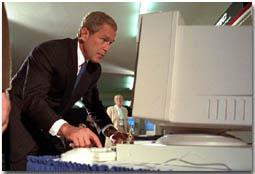 Empowering Citizens
Empowering Citizens
 The President believes that technology can make the American dream accessible to more Americans, as well as improve the delivery of government services to all citizens. For example, assistive technology helps people with disabilities work and participate in community activities. New e-government initiatives will ensure that agencies leverage e-commerce technologies to communicate with business. Overall, the federal investment in technology represents an opportunity to free-up billions of dollars of wasteful federal spending, to accelerate government response times from weeks to minutes, and to directly support companies, jobs and research and development in the information technology sector.
The President believes that technology can make the American dream accessible to more Americans, as well as improve the delivery of government services to all citizens. For example, assistive technology helps people with disabilities work and participate in community activities. New e-government initiatives will ensure that agencies leverage e-commerce technologies to communicate with business. Overall, the federal investment in technology represents an opportunity to free-up billions of dollars of wasteful federal spending, to accelerate government response times from weeks to minutes, and to directly support companies, jobs and research and development in the information technology sector.
Already, the President has:
Expanded E-Government. The President has made "Expanded Electronic Government" one of his five management priorities for the entire federal government. Despite spending more than $50 billion on IT, the federal government has not achieved productivity gains commensurate with commercial firms. Led by the Office of Management and Budget, the Administration is deploying 24 high payoff e-government initiatives to maximize government productivity gains from technology, eliminate redundant systems, and significantly improve government’s quality of service for citizens and businesses over the next 18 to 24 months.
Promoted Assistive Technology. As part of his New Freedom Initiative launched February 1, 2001, the President offered a comprehensive package of initiatives to increase research in, and access to, assistive technologies, including:
- Increasing funding for Rehabilitative Engineering Research Centers ($20 million).
- Increasing funding for low-interest loan programs to help people with disabilities purchase assistive technology ($35 million).
Made Federal Information Technology Accessible to People with Disabilities. Leading by example, the federal government is promoting the interests of Americans with disabilities, as it works closely with the high tech industry and disability community to ensure full and successful implementation of Section 508, which ensures that information technology purchased by the federal government is accessible to Americans with disabilities. The redesigned White House Web site has been hailed as a model of Section 508 compliance, and President Bush is committed to extending this model throughout the entire federal government, to ensure that the benefits of e-government are available to all Americans, regardless of disability.
Strengthened Privacy Protections. President Bush believes that government has an important role to play in helping ensure that every American has control over his or her personal information, and that the Internet is a safe, secure and rewarding environment. The President and his Administration have taken a number of steps to strengthen Internet privacy protections, including:
- Swift implementation of new medical privacy protections that give patients greater access to their own medical records and more control over how their personal information is used.
- Strong enforcement of children’s privacy rights, including prosecuting the first five cases under the Children’s Online Privacy Protection Act.
- Creation of a national "do not call" list that allows consumers to remove their names from telemarketing lists with a single phone call.
- Announcing six spam settlements during National Consumer Protection Week in February 2002.
Acted to Thwart Identity Theft. The Administration announced a renewed crack-down on identity thieves on May 2, 2002. Working in conjunction with state and local law enforcement, the Department of Justice announced 73 new criminal prosecutions charging 134 individuals in 24 districts with identity related crimes. The Administration asked Congress to pass new legislation to help further thwart identify theft, including the establishment of longer prison terms and a new charge of "aggravated identity theft" for those who steal identities to commit crimes. The Administration also created a universal identity-theft affidavit to help identity-theft victims restore their good name. This useful new tool will save consumers time and aggravation when they dispute fraudulent debts and accounts that were opened in their name without their consent.
Promoted Teleworking. The President believes that teleworking is good for families, persons with disabilities, and the environment because it gives workers the flexibility to meet everyday demands. Given such benefits, the President has taken a number of steps to promote telework. For example, within the first two weeks of his administration, President Bush proposed a $20 million "Access to Telework Fund" to expand employment opportunities for individuals with disabilities by increasing access to teleworking equipment.
[
Introduction
|
Previous Chapter
]


 The President believes that technology can make the American dream accessible to more Americans, as well as improve the delivery of government services to all citizens. For example, assistive technology helps people with disabilities work and participate in community activities. New e-government initiatives will ensure that agencies leverage e-commerce technologies to communicate with business. Overall, the federal investment in technology represents an opportunity to free-up billions of dollars of wasteful federal spending, to accelerate government response times from weeks to minutes, and to directly support companies, jobs and research and development in the information technology sector.
The President believes that technology can make the American dream accessible to more Americans, as well as improve the delivery of government services to all citizens. For example, assistive technology helps people with disabilities work and participate in community activities. New e-government initiatives will ensure that agencies leverage e-commerce technologies to communicate with business. Overall, the federal investment in technology represents an opportunity to free-up billions of dollars of wasteful federal spending, to accelerate government response times from weeks to minutes, and to directly support companies, jobs and research and development in the information technology sector.

